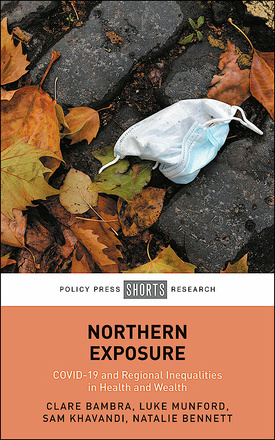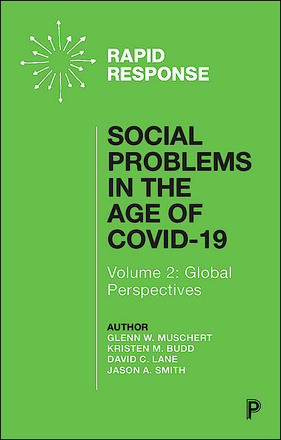SOCIAL SCIENCE / Social Classes & Economic Disparity
Northern Exposure
COVID-19 and Regional Inequalities in Health and Wealth
Using original data analysis from a wide range of sources, this book addresses the vital contemporary issue of regional inequality through the impact of COVID-19.
Social Problems in the Age of COVID-19 Vol 2
Global Perspectives
Published with SSSP, this book addresses the greatest social challenges facing the world as a result of the COVID-19 pandemic. The authors propose public policy solutions to help refugees, migrant workers, victims of human trafficking, indigenous populations and the invisible poor of the Global South.
Social Problems in the Age of COVID-19 Vol 1
US Perspectives
This book provides accessible insights into pressing social problems in the United States in the aftermath of the COVID-19 pandemic and proposes public policy responses for victims and justice, precarious populations, employment dilemmas and health and well-being.
Researching the COVID-19 Pandemic: A Critical Blueprint for the Social Sciences
Challenging social science’s established orthodoxies, this book is a call for academia to embrace new theoretical frameworks and research methods to better understand the reality of life in a post-Covid world.
Why We Can't Afford the Rich
Why we can’t afford the rich exposes the unjust and dysfunctional mechanisms that allow the top 1% to siphon off wealth produced by others. With an updated Afterword, Andrew Sayer shows how the rich worldwide have increased their ability to hide their wealth, create indebtedness and expand their political influence.
Betraying a Generation
How Education is Failing Young People
Ainley explains how English education is now driven by the economy and politics, having failed to deliver upward social mobility and a brighter future. Concludes with suggestions for positive change.
Uncomfortably Off
Why Addressing Inequality Matters, Even for High Earners
Uncomfortably Off reveals that those generally considered to be the most affluent feel anxious about the future and struggle to keep up, or even to stay put., but reducing income inequality will benefit everyone, even those quite near the top.
Snobbery
Snobbery matters because it is the way in which social divisions are built. In these times of growing social inequality, snobbery is becoming ever more pertinent. This book draws on literature, popular culture and autobiography as well as sociology and history to take a fresh and engaging look at this key social and cultural issue.
Austerity Bites 10 Years On
A Journey to the Sharp End of Cuts in the UK
With new commentary, Austerity Bites 10 Years On assesses on the true scale of the damage austerity policies have inflicted on the country’s most vulnerable groups, public institutions and on the wider society, reflecting on where we have been, where we are now and what needs to happen next to undo the damage and avoid the same mistakes again.
The End of Aspiration?
Social Mobility and Our Children’s Fading Prospects
Duncan Exley draws on expert research and real life experiences – including from an actor, a politician, a billionaire entrepreneur and a surgeon – to issue a wake-up call to break through segregated opportunity. He offers a manifesto to reboot our prospects and benefit all.
The New Working Class
How to Win Hearts, Minds and Votes
Who is working class today and how do political parties gain their support? This insightful book proposes what needs to be done to address the issues of the 'new working class'. It provides practical recommendations for political parties to reconnect with the electorate and regain trust.
Parents, Poverty and the State
20 Years of Evolving Family Policy
Naomi Eisenstadt and Carey Oppenheim explore the radical changes in public attitudes and public policy concerning parents and parenting, arguing that a more joined-up approach is needed to improve outcomes for children: both reducing child poverty and improving parental capacity by providing better support systems.


















